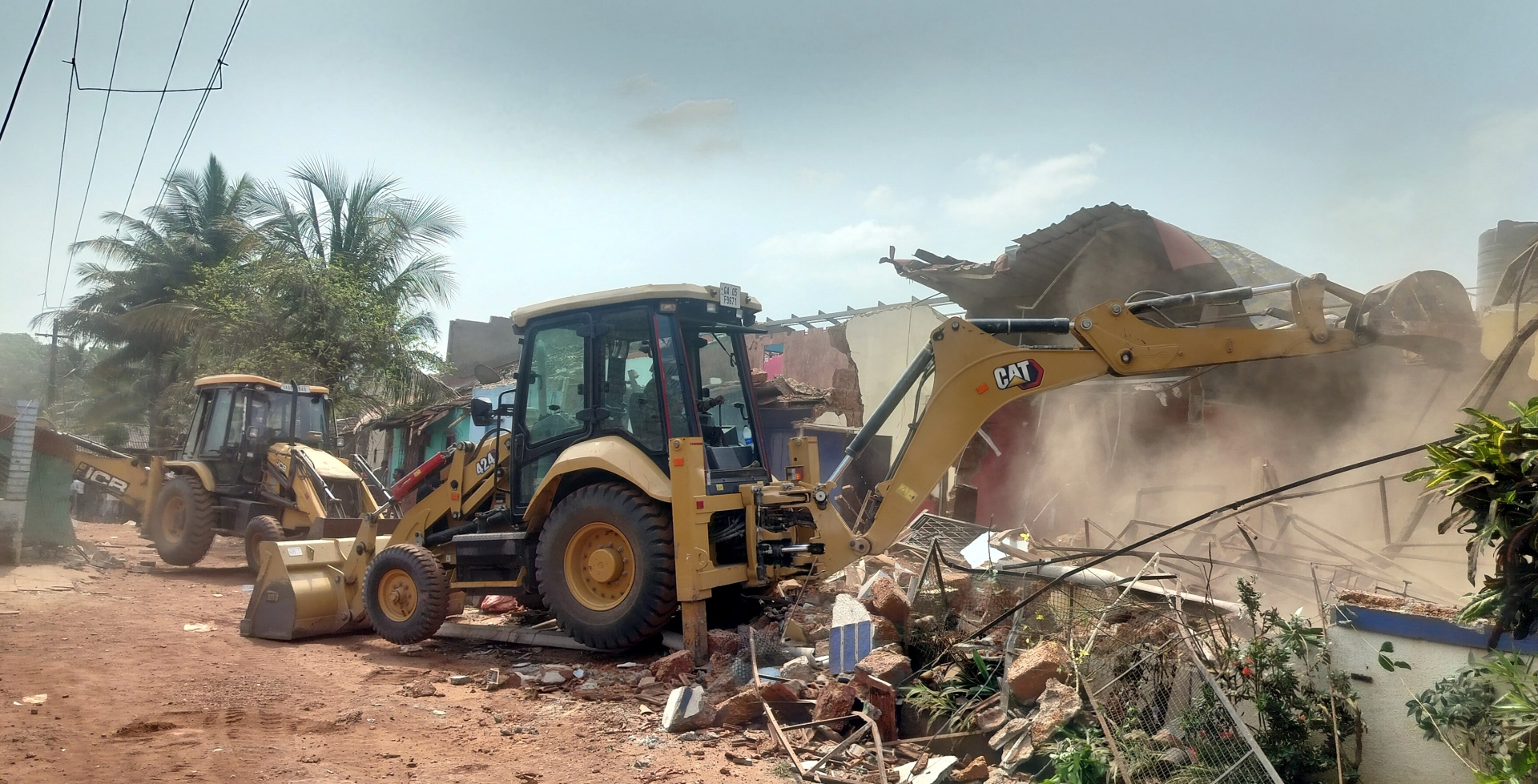Tivim Comunidade’s legal saga finally ends in demolition Ops conducted peacefully under tight police supervision

ALL FALL DOWN: Bulldozers tear through illegal structures at Lala ki Basti in Tivim on Tuesday, bringing down walls one blow at a time.
Photo Credits: Agnelo Pereira
MAPUSA
Decades-old homes in the area known as “Lala ki Basti” came crashing down on Tuesday, ending a prolonged legal and emotional saga that had gripped the quiet village of Tivim for years.
Twenty-three illegal homes were demolished in a high-stake, court-mandated operation following a High Court order.
The operation, carried out by State authorities under the watch of police and civil officials, unfolded with clinical precision and a heavy emotional undertone, as generations-old homes gave way to the law.
Quiet end to a long battle
Most families had already evacuated their homes, aware that their legal avenues had been exhausted.
For several years, the residents – mostly migrants – fought an uphill legal battle to retain the homes they had lived in for decades.
But in a final verdict last year, the High Court ruled in favour of the Tivim Comunidade, declaring the houses illegal and ordering their demolition.
While the demolition passed without major incident, a few poignant moments stood out.
Two women clutched documents and stood their ground, refusing to vacate their houses until law enforcement gently but firmly enforced the court's direction.
“We have been staying here for the last 30 years. My children were born and raised here. The local Comunidade gave us this land. We have a certificate provided by their officials. Lala, who was the tenant here, had handed over the land to us,” said Khurshid Ahmed, one of the residents, speaking to reporters with folded hands.
His plea echoed a shared sentiment among many residents: a deep connection to the homes they built, despite lacking legal ownership.
Tivim comunidade: Nothing personal; law is law
Attorney for the Tivim Comunidade, Savio Pereira said the demolition was long overdue and necessary.
“There was a perception that the Comunidade is powerless, that demolitions will never happen. Today, finally, it has. I’m not happy because people lost homes – it’s nothing personal. But law is law. It’s a victory for the Gaunkars. Everyone stood together for years, saying this has to go,” Pereira said.
According to court, the houses were built without any official sanction on Comunidade land in survey numbers 343/14.
Plans to evict and demolish the homes date back to 2010, but the process faced delays due to bureaucratic hurdles and social tensions.
Delayed but inevitable
Eviction notices were issued in two phases, targeting 25 structures and instructing residents to vacate before a court-set deadline.
The demolition was initially scheduled to commence after March 11 but was temporarily postponed out of respect for the holy month of Ramzan.
The structures, built primarily by migrant families, had become a flashpoint in the community, sparking debates over land rights, housing justice and the authority of traditional village institutions.
While 23 houses have been brought down following the court’s directive, an equal or even greater number of structures continue to stand in the same area – each now facing the possibility of similar legal action.
“This is just the beginning. In light of the recent High Court order, we are now in the process of identifying all illegal constructions on Comunidade land. This demolition should serve as a wake-up call to all encroachers – such violations will no longer be tolerated,” the Tivim Comunidade attorney said.
If the attorney’s words are any indication, the days ahead could prove troubling for others in the area whose homes may also be found to be on disputed land.